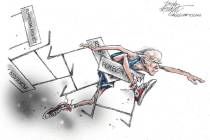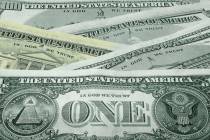To Catch A Thief
I grew up in a different country.
Kids I grew up with in the 1950s suburbs can remember their moms putting greenback dollars in plain white envelopes, writing on those envelopes "Insurance man" or "Milkman," and sticking the envelopes to the refrigerator door with little magnets.
Later in the day, when no one was home, those men would enter the house through the unlocked kitchen door and take the moneys owed them. No one ever worried that they, or anyone in the neighborhood, would steal anything from the unlocked house.
On a trip to the store in the center of town, occasionally a tyke would pick up a small toy and carry it out to the car. Arriving home, Mom and Dad would ask each other who'd paid for the small item. No one had paid. So the family would dutifully travel the two miles back to the store so the toy could be returned with a tearful apology.
How many young parents would do that today? Some.
During the flush times, those who were doing well enough to shop at the upscale stores, where you got a personal salesgal, may have missed the change. Now that the federal government is blocking an economic correction as surely as Hoover and Roosevelt did through the 1930s, though, now that hard times are driving a lot of the formerly middle class to shop thrift stores and second-hand malls, it's right there in your face.
It's not just the surveillance cameras, the portals that beep if you try to sneak something out. Note the signs that say "Items without price tags will not be sold." Note the way the thrift shops write the prices of second-hand shoes and coats on shoe soles and inside coat collars in indelible black marker. Look at how the pricier stuff is locked up in glass cases. Note the ever larger, stickier, harder-to-remove price labels that can essentially ruin the resale value of books and all kinds of other products. Why are they doing that?
Because today's shoppers will switch the price tag of a cheaper item onto a more expensive one if they can get away with it. They'll rip off and hide a price tag, offer a lesser sum at the cash register, hope the busy cashier will fall for it.
Why is only one boot of an expensive pair left out to try? Because too many of them "walk out the door." The biggest frustration for retailers isn't even the fact they have to factor into their pricing a certain amount of "inventory shrinkage." It's the knowledge that even that one time in a hundred when you might actually catch such a scumbag red-handed, there's nothing to be done.
Grab them by the collar, slam them to the floor, sit on them till someone can call the cops? "He says that's the price tag that was on there when he picked it up. OK, but you'll have to come down to court, probably three or four times; you'll lose a half-day of work each time. Then, unless it's the eighth or 12th provable offense, the judge'll let him go with a slap on the wrist, release to his mom's supervision. By the way, he says you hurt him and he's going to sue."
Is it any wonder struggling proprietors, nearly bankrupted already by jacked-up taxes and parasitical regulators, lie awake at night fabricating fantasies that feature Clint Eastwood and a .44 magnum?
I happened to catch a few minutes of Dr. Dean Edell on the radio. He said the reason people oppose Obamacare is that Americans want top-notch health care but they don't want to pay for it.
That's exactly backward. When I was a kid, most people did want to pay for their health care. They might only be able to pay the doctor with fresh eggs from their hens, or by sending him five dollars a month, but they paid.
The last time I went in for a diagnostic test they asked me if I wanted it done in the doctor's office or the hospital. I asked, "Which is cheaper?" The answer -- I kid you not -- was "What do you care? The insurance is paying." They told me I was the only patient they could remember who insisted on knowing which was cheaper.
And I have private insurance. I "pay for my own health care," even if it goes through a risk pool. Imagine what the incentive is for an American on Medicare or Medicaid to argue, "I'm not sure I need all these tests. This must be costing a fortune. What's the cheapest way to go?"
No incentive at all. So doctors do 25 percent more than they really need to, to cover their butts against lawsuits. Then they're forced to jack up their charges by another 25 percent to pay all the clerks they have to hire to "negotiate" with the big insurance companies -- the biggest of which are called "Medicare" and "Medicaid." Then the government, which has guns, tells the doctors and hospitals they're only going to be paid 80 percent. No, 70 percent. No, 60 percent of their costs, and declares "costs have been reduced."
Costs have not been reduced. The medical profession just shifts those costs to the ever-fewer free-market patients. Then -- this is the best part -- the politicians scream "These greedy medicos are raising their prices through the roof, despite our best efforts at cost-containment! Clearly we need direct government control!"
And we're surprised when young folk think it's all giggly fun to peel the price stickers off $3 items, stick them on $10 items, and pretend costs have been reduced.
"My Daddy's a lawyer, and if you touch me, I'll sue. You're just greedy, anyway. All this stuff should be free to the people. I've got a right to free health care. I've got a right to free stuff. It's part of my human dignity. Teacher says."
But it's coming to an end. The pendulum is about to start swinging the other way, and the thing about pendulums is they don't generally stop when they get back to a reasonable middle ground. I fear some of us will live to see corpses hanging from light poles, with signs pinned to their chests reading "Thief said he / would sue us." Some of us will live to see central bankers who lived off treasure looted from the productive class by stealing our savings and replacing them with funny money suffer similar fates.
Is that a threat? No more than it's a threat to say "Kids who play in traffic will eventually get hurt."
I hope all these thieves get religion and change their ways. But I wouldn't bet on it.
Vin Suprynowicz is assistant editorial page editor of the Review-Journal, and author of "Send in the Waco Killers" and the novel "The Black Arrow." See www.vinsuprynowicz.com/.























